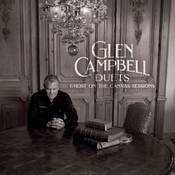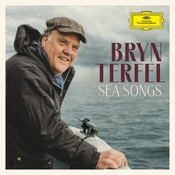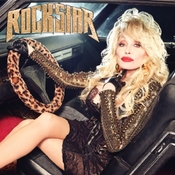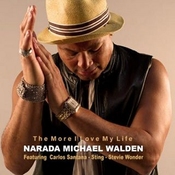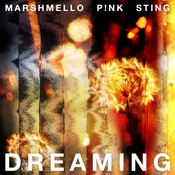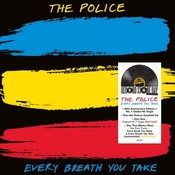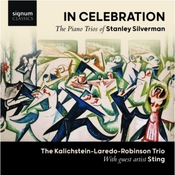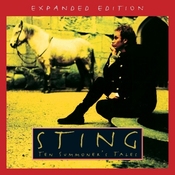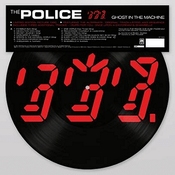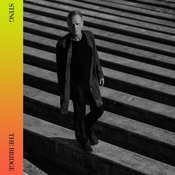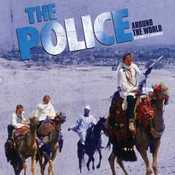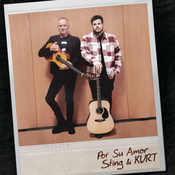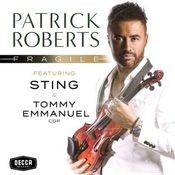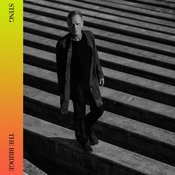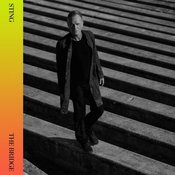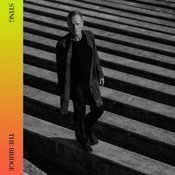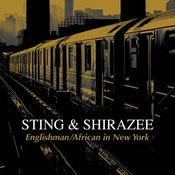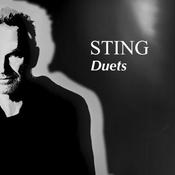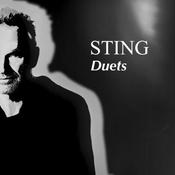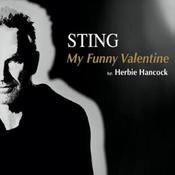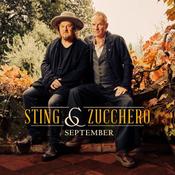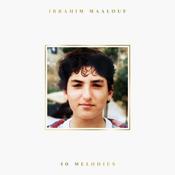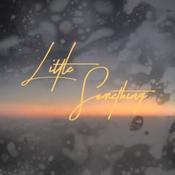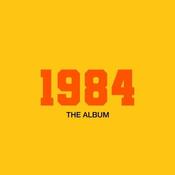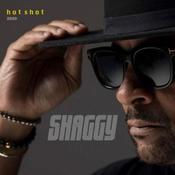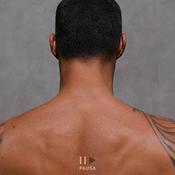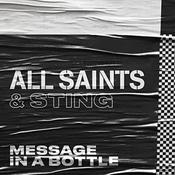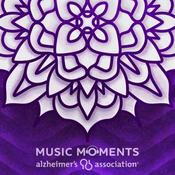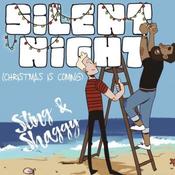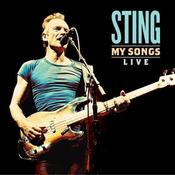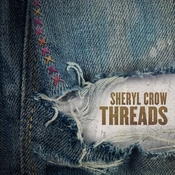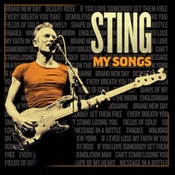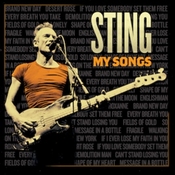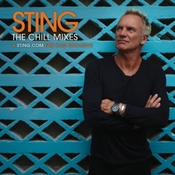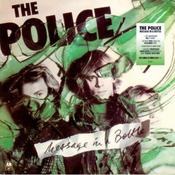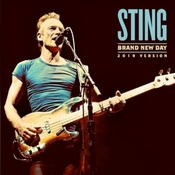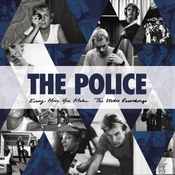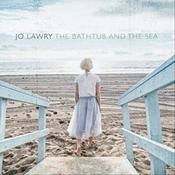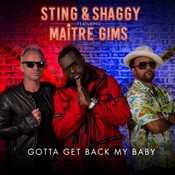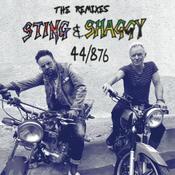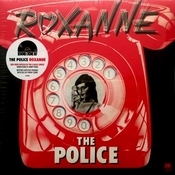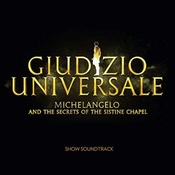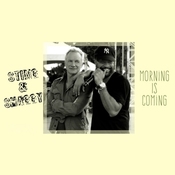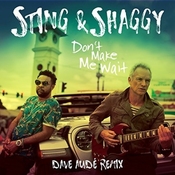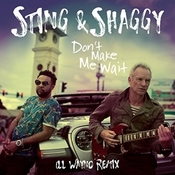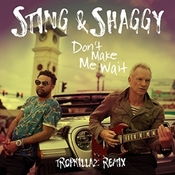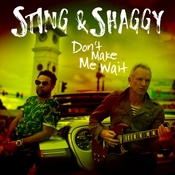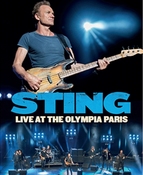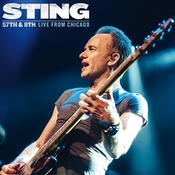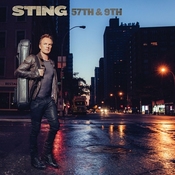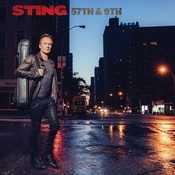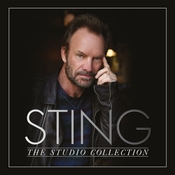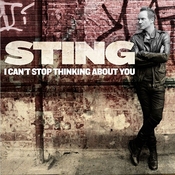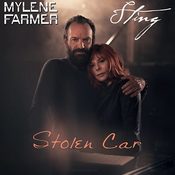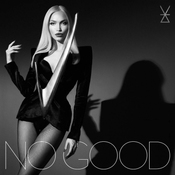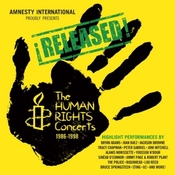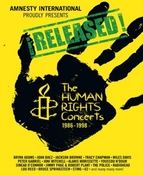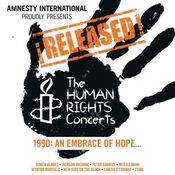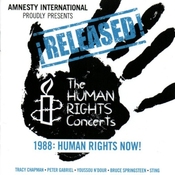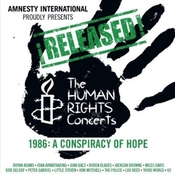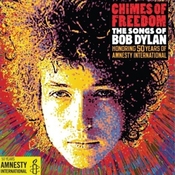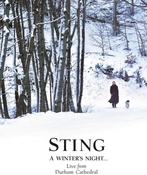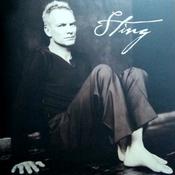The Bridge
- Rushing Water lyrics
- If It's Love lyrics
- The Book Of Numbers lyrics
- Loving You lyrics
- Harmony Road lyrics
- For Her Love lyrics
- The Hills on the Border lyrics
- Captain Bateman lyrics
- The Bells of St. Thomas lyrics
- The Bridge lyrics
- Waters of Tyne (Deluxe bonus track) lyrics
- Captain Bateman's Basement (Deluxe bonus track) lyrics
- (Sittin' On) The Dock of the Bay (Deluxe bonus track) lyrics
- The Lord Must Be In New York City (Japanese exclusive bonus track) lyrics
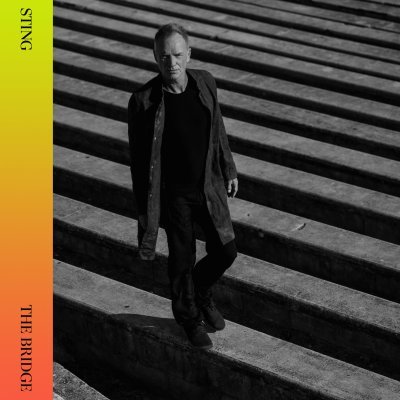
Soundbites
The Bridge showcases Sting’s prolific and diverse songwriting prowess, with this new set of songs representing styles and genres explored throughout his unrivalled career. The lead track “If It’s Love” is available now on all digital platforms. The upbeat, breezy and infectious pop tune exhibits his undeniable gift for melody. In his signature voice, and taking a different approach to a straight-forward love song, Sting likens contemplating his romantic feelings to calling the doctor about his symptoms.
"I’m certainly not the first songwriter to equate falling in or out of love with an incurable sickness, nor will I be the last,” says Sting. “’If It’s Love’ is my addition to that canon where the tropes of metaphorical symptoms, diagnosis, and downright incapacity are all familiar enough to make each of us smile ruefully."
The Bridge was written in a year of global pandemic and finds Sting ruminating on personal loss, separation, disruption, lockdown, and extraordinary social and political turmoil.
Exploring a multitude of concepts and themes, a “bridge” represents the enduring and ever-evolving link between ideas, cultures, continents, and even the banks of a river. It’s also a route into the past, and so it was that Sting found himself considering the music and the places that have formed his own foundations, and that indeed are embedded in his very DNA.
He explains, “These songs are between one place and another, between one state of mind and another, between life and death, between relationships. Between pandemics, and between eras – politically, socially and psychologically, all of us are stuck in the middle of something. We need a bridge.”
Representing various stages and styles from throughout his career and drawing inspiration from genres including rock n’ roll, jazz, classical music and folk, the eclectic album features Sting’s quintessential sound on pop-rock tracks such as the album’s opening rock salvo “Rushing Water” and new indie-pop sounding “If It’s Love,” to the smoldering electronic ballad “Loving You” and the romantic “For Her Love” which evokes Sting’s trademark “Fields of Gold” period. “The Book of Numbers,” “Harmony Road” and “The Bells of St. Thomas” showcase Sting’s collaboration with his long-time guitarist/“right and left-hand,” Dominic Miller.
Written and recorded over the last year in lockdown, a coterie of trusted musicians beamed into Sting’s studio remotely including Dominic Miller (guitar), Josh Freese (drums), Branford Marsalis (saxophone), Manu Katché (drums), Martin Kierszenbaum (keyboards), Fred Renaudin (synthesizer) and backing vocalists Melissa Musique, Gene Noble, Jo Lawry and Laila Biali, The Bridge’s influences are vast; from grappling with the murky origins of the folk ballads in Cecil Sharp’s ‘Collection of English Folk Songs’, to J. Robert Oppenheimer, from the Roman history of Northumbria to Saint Thomas.
All songs on The Bridge are produced by Sting and Martin Kierszenbaum, except “Loving You” produced by Sting, Maya Jane Coles and Martin Kierszenbaum. The album was mixed by Robert Orton, engineered by Donal Hodgson and Tony Lake, and mastered by Gene Grimaldi at Oasis Mastering.
The Bridge will be released in multiple formats, including standard and deluxe CD and vinyl, Japanese Exclusive standard and deluxe albums, all digital streaming and download platforms, as well as a music cassette. The deluxe CD and vinyl will include bonus tracks “Waters of Tyne,” “Captain Bateman’s Basement,” and “(Sittin’ on) The Dock of the Bay.” Both Japanese exclusives will be on SHM-CD including the additional bonus track “I Guess the Lord Must Be in New York City,” while the deluxe version will also include a DVD with an interview and track by track discussion with Sting, as well as music videos for “If It’s Love” and “Rushing Water.”
Later this month, Sting will return to the live arena with a performance in Sicily on September 27 followed by concerts at the historic Odeon of Herodes Atticus in Athens on September 30 and October 1. Soon after, he will launch My Songs: The Las Vegas Residency beginning October 29 at the The Colosseum at Caesars Palace featuring a compendium of his most beloved songs with dynamic, visual references to some of his most iconic videos and inspirations.
Sting, The Bridge, review: pure, timeless pop class... 4/5
The former Police man's 14th solo album shows where Ed Sheeran and Adele might be in a few decades' time – if they're lucky.
It is a brave or foolish pop star who puts out their new album the same week as the return of Adele. The British chanteuse is set to sweep all before her, as her much-heralded new release arrives today to challenge Coldplay, Ed Sheeran and Abba for the all-important Christmas sales top spot. So spare a thought for former Police-man Sting, in danger of becoming the forgotten superstar as he unveils a 14th solo album of impeccable songcraft, sublime musicianship and soulfully sensual vocals to precious little fanfare.
The Bridge is business as usual for the well-preserved 70-year-old singer-songwriter, even if his old bass-playing fingers are no longer on the mainstream pop pulse. There are no hi-tech sonic twists, guest rappers or desperate attempts to co-opt contemporary trends. Recorded in a home studio during lockdown with long-distance contributions from backing musicians, it is still all about virtuoso playing of elegantly constructed songs whose literate lyrics reach for emotion and profundity. The sound is plush and luxurious, with Sting’s softly sandpapered vocals to the fore. It’s a fair bet that half of these tracks would have been inescapable had they been released in his commercial prime.
The opener, Rushing Water, is driven by a sharp Police-like guitar lick and snapping drum beat as Sting tangles with the creative power of the subconscious. If It’s Love is a slick ditty playing with the familiar songsmith trope of being diagnosed with a lethal dose of amour fou. For Her Love is sensual and moody, with Sting floating above atmospheric synthesizers and a hypnotic guitar motif. Loving You may be the album’s highlight, with a sinister bluesy pulse as Sting evokes a betrayed lover’s jealous testimonial to wounded devotion. “We made vows inside the church / To forgive each other’s sins / But there are things I have to endure / like the smell of another man’s skin / If that’s not loving you, I don’t know what is...”
As ever with Sting, there is a tendency to over-wordiness and clever-cleverness, with the complex time-signature of Harmony Road making his thoughtful sketch of economic injustice easier to appreciate than to love, although I can forgive a lot for the scintillating Branford Marsalis saxophone solo. About half of the album explores Sting’s fascination with narrative folk styles, crafting ambiguous stories of strange encounters with angels and devils to tones of acoustic guitars, fiddles and melodeons. The best of these, The Bells of St Thomas, is an extraordinary piece, a subtle meditation on betrayal based around a Dutch renaissance painting by Peter Paul Reubens. You won’t find anything like that on an Ed Sheeran album.
Sting last scored a number one album in 1991, with the Soul Cages. That he is still operating at the same creative pitch 30 years on should stand as a beacon to younger, headline-grabbing artists. This is where Adele and Sheeran might be in a few decades time, if they’re very lucky and remain committed to their art and craft. The Bridge is out of time yet timeless, pure pop class.
(c) The Daily Telegraph by Neil McCormick
Sting, Vivid Author of Spiritual Pop, Brings Vivid Characters to Life in Beautiful New Album, “The Bridge”.
We first met Sting, all of us, circa late 1978 with “Roxanne,” the story of a call girl the narrator was trying to rescue from her vocation. Roxanne, who could walk the street for money, she didn’t care if it was wrong or right. “Roxanne” was the first captivating fictional character in a long line of them now extending over 40 years in songs by Gordon Matthew Sumner.
Along the way, Sting wrote a poignant memoir, “Broken Music,” and a Broadway musical about his life growing up in Newcastle called “The Last Ship.”
What sustains all those songs though is that they are not just love songs, or musings on fame. Unlike the songwriters of today, Sting constructed plots and stories, characters with names and emotions and aspirations. It’s why we go back to them over and over. From Roxanne to the King of Pain to the romantics in those fields of gold, Sting paints an aural picture in every song and draws us in.
So, too, in his beautiful new layered album, “The Bridge.” He’s smart: the first three or four tracks are the singles, all very catchy, especially “If It’s Love,” which is deceptive the way “Every Breath You Take” was, but hidden depths. Listen to it a couple of times. It’s top 40 with a bite.
I’ve already expressed my love for “Rushing Water,” which kicks off the album. Also a “hit” in the old sense that has a haunting undercurrent:
This is the sound of atmospheres
Three metric tonnes of pressure
This is the sum of all my fears
Something I just can’t measure
“Rushing Water” ties directly to the title track, “The Bridge,” the sneaky elegy for the songs that come in between. There are plenty of Roxanne like characters, from “Captain Bateman” (which has disarming harmonics) and the people who long to leave the violence on “Harmony Road.” “The Bridge” album is a collection of short stories.
There’s actually a whole movie in “The Bells of St. Thomas” with the main character waking up in Antwerp in the bed of a rich woman who thinks he’s dead. (This song deserves a Grammy and an Oscar.)
Don’t know how I got here
Or if I was led
But I know it’s a Sunday
For the bells in my head
And when you get to the actual “Bridge,” it’s a spiritual crossing:
We are but bags of blood and bone, yet we carry the weight of our sons and our daughters.
And now the fields are all but drowned, and we climb up to the ridge,
Some will seek the higher ground,
Some of us the bridge.
A friend of mine in music publishing who has nothing to do with Sting said to me today, “He’s done something very unusual with this album, very different and important.” We take our rock superstars for granted a lot because we’ve already had the hits, the legacy.
But my friend is right. “The Bridge” is a moment, and after 15 solo albums (plus all of the Police) it’s a remarkable achievement. It hearkens back to “The Soul Cages.” And still is very accessible. The compositions are so rich and textured, put on real headphones if you can and listen to Branford Marsalis and Dominic Miller and all the other players. “The Bridge” is a treat.
(c) Showbiz411 by Roger Friedman
Sting - THE BRIDGE (Universal) ★★★½
Sting’s boyish voice was, like the catchy tunes, reggae beats, restrained guitar and effusive drumming, a hallmark of The Police, and that youthfulness has never quite deserted him. Now 70 – an age when most voices deepen, darken, grow huskier, become wobblier or all four – Sting still sounds like he’s just embarking on a career. How does he do that?
The Bridge has him bundling up his established interests in pop, R&B, folk and a dash of jazz – which could also be described as treading musical water. Lyrically, meanwhile, the lockdown has seen him create contemplative characters often weighing up choices, with the bridge of the title being the ineradicable link between us all. Primarily playing bass, Sting is surrounded by a classy band including guitarist Dominic Miller, keyboards player Martin Kierszenbaum and drummers Manu Katche and Josh Freese.
After the surging pop-rock of Rushing Water, the breezy If It’s Love likens falling in love to falling sick, while The Book of Numbers is more haunting and wouldn’t have been out of place on The Dream of the Blue Turtles. Even better is Loving You, with Maya Jane Coles (who shares the composing credit) creating the soundscape for a song about jealousy and infidelity. Harmony Road, penned from the perspective of someone keen to escape the wrong side of the tracks, is leavened with a glorious little soprano sax solo from Branford Marsalis.
For Her Love exemplifies Sting’s prettiest songwriting, and then there are three folksy ballads: The Hills on the Border, Captain Bateman (about a jailer’s daughter visiting a captive naval officer) and Waters of Tyne. The Bells of St Thomas has his double bass teamed with Katche’s brushes and the merest sighs from Miller’s guitars, all lilting on a beautifully crafted morning-after song, the lyrics touching upon a Rubens painting and the fruits of sin. The understated gem of a title track has him delving into his voice’s lower reaches, and Captain Bateman’s Basement is huge fun: a jazzier Captain Bateman, with Sting singing wordlessly in tandem with his bass and the brilliant Katche stretching out a little. Finally, and surprisingly, comes a charming cover of Sitting on the Dock of the Bay. If excessive earnestness has sometimes compromised Sting, it’s shrugged aside here by an artist who still sounds in his prime.
(c) The Age by John Shand
When his father died in 1987, Sting suffered writer's block and didn't release any music for four years. In 2020, his tour manager Billy Francis, who had supported him since his Police days, succumbed to cancer, which threatened to derail Sting. But this time, the sounds returned to him more quickly. And he doesn't sound meditative, as one might have feared, but rather extroverted.
The most common accusation leveled at Sting is that of pedantry: He acts like a well-educated emissary. However, he has abandoned this path since his 2016 album "57th and 9th" at the latest. Sting only addresses things indirectly. Contrary to what the lyrics suggest, "The Book of Numbers" is not about the devil himself, but rather about the "Destroyer of Worlds" Robert Oppenheimer. "Captain Bateman" isn't the story of a Disney buccaneer, but rather a near-literal translation of an old British folk tune. In the additional track "Captain Bateman's Basement," he transforms it into funk rock—the "basement" in the song stands for the psychoanalytic "basement," the unconscious, the realm of the instincts. "The Bridge," in turn, is a symbol of the arduous path to bliss at the end of life. This sounds profane, but it's no longer so when the lyrics, even if we guess what they're getting at, still require interpretation. Sting doesn't sing, "This is how to change the world," but rather, "Open the gates that we may follow."
One of the greatest challenges in pop music is the melody that's not sung, but whistled. It has to be light, as if plucked from the air, yet carry the entire song. Is there anything more difficult in pop than composing a successful chorus that doesn't require words? Sting demonstrates it in "If It's Love," and he sings without wanting to carry the weight of the world on his shoulders. He sings about making himself a coffee while thinking about how he could have fallen in love again. The album is dedicated to his late mentor Billy Francis. But it's a celebration of life.
(c) Rolling Stone (Germany)
Sting’s 15th LP The Bridge an eclectic mix dripping with intrigue
Sting has a Las Vegas residency extending into 2022 but chances are his Caesar’s Palace audience won’t be treated to songs from his 15th solo album. Unlike 2016’s sub-U2 rock outing 57th and 9th, with its open-ended themes of searching, travelling and the lure of the unknown, this one’s a far more eclectic mix of Celtic and British folk legends, dark tales of deception, recurring dreams and trammelled lust. The Bridge is as musically diverse as its subject matter: violins, accordions, brushed drums and Branford Marsalis’s wistful soprano sax rub shoulders with understated synths, traditional keys and the textured guitars of Dominic Miller, Sting’s loyal sideman of 20 years. There’s only one outright rock track, the crystalline opener Rushing Water, and a token pop song in the annoyingly trite If It’s Love, with its whistled hookline and hackneyed allegory of romantic obsession as reportable illness. The more engaging material dips in and out of folk and jazz: The Book of Numbers, on which Sting interrogates the scriptures; Harmony Road, a trip to the other side of the tracks; and The Hills on the Border, another pastoral parable dripping with atmosphere and intrigue.
Captain Bateman, a folk tale of an imprisoned seafarer who falls for his jailer’s daughter, stretches sparing strings over its jaunty rhythm, while The Bells of St Thomas (heralded by, yes, bells) is an otherwise subtle meditation on betrayal that speaks to a Renaissance-era painting by Dutch artist Peter Paul Rubens. Betrayal is, of course, a stock theme of Sting’s, and it finds its ultimate expression here on Loving You, a cuckolded husband’s catalogue of wounded devotion: “We made vows inside the church / To forgive each other’s sins / But there are things I have to endure / Like the smell of another man’s skin / If that’s not loving you, I don’t know what is …” Even more sinisterly, the song’s protagonist confesses he is “given to jealousy … and driven to violence”. It’s some distance from the neo-hippie drift of the title track, another largely acoustic song that pleads for unity as the world tries to deal with pestilence and climate change. Again, probably not one for a Vegas crowd out to hear the hits.
(c) The Australian by Phil Stafford
Review: Sting – The Bridge
If someone knows what it means to be in between, it’s Sting. In between countries, in between genres, in between generations. In a prolific career that spans over five decades, the singer has never been one to accept limitations or bow down to barriers. Already in the 70s and 80s, when he was the lead singer and main songwriter for the successful British band The Police, their musical style blended rock‘n’roll, new wave, jazz, and reggae. Their song “Every Breath You Take”, written by Sting, is recognized as the most-played song in radio history, and the group was inducted into the Rock and Roll Hall of Fame in 2003.
In the course of his brilliant solo career, Sting ventured even further into musical experimentation. Of course, who doesn’t know the wonderful songs “Englishman In New York” and “Fields Of Gold”? But Sting did not stay in his comfort zone. In 2006, he released “Songs From The Labyrinth”, a personal interpretation of the work of John Dowland, a British Renaissance composer, which earned the singer recognition in the classical world. But he did not stop there. He ventured into Rai, worldbeat, and film soundtracks, received eleven Grammy Awards for his solo career, including Best Reggae Album in collaboration with Shaggy, and was even nominated for three Academy Awards for Best Original Song. So what does an artist like Sting have left to prove? Absolutely nothing. But what does he have to offer? So very much!
The main thing the singer gives us in his new album “The Bridge” is hope. And boy, do we sorely need it! These last couple of years have been tough for many people. Pandemic, recession, and conflicts have pushed a lot of people to withdraw, to feel lonely and isolated. With “The Bridge”, Sting wants to extend a hand and help the people bridge the gap between us. In his own words: “These songs are between one place and another, between one state of mind and another, between life and death, between relationships. Between pandemics, and between eras – politically, socially and psychologically, all of us are stuck in the middle of something. We need a bridge.”
In the usual style of the versatile singer, the album mixes rock, folk, and pop music, amongst other genres, showing the many facets of Sting’s talent, both as a songwriter and as a musician. Title song “The Bridge” is a sweet philosophical ballad musing on life, death, transition, and the human condition. That’s the magic of Sting’s songs. You thought you were listening to music, and you’re back in philosophy class. Or is it the reverse? The lyrics refer to a ghostly bridge that leads… somewhere. Is it to a new life, to the afterlife, to a mystical land, or simply to a new state of mind? The choice is up to us, but very few would be able to resist the temptation to go on this journey. “They say there’s a bridge out there, out there in the mist / Some will deny it’s there, others will tell you it don’t even exist / It’s not made of iron or steel nor stone, yet it spans the rising waters”. Perhaps it’s a call to move on from the darkness and negativity of these past couple of years. Perhaps it’s an invitation to reach out to our fellow human beings and to reforge bonds between one another. In any case, the short folk song is almost a spiritual experience, reminding us that life goes on, flowing like a river, and that we are not alone in this great adventure: “Open the gates that we may follow / Open the bridge to all of us / Open the floodgates to the river / Open the bridge that we may cross”.
The theme of flowing waters, cleansing, unstoppable, inviting, and giving life, is also the leitmotif of the first song on the album, “Rushing Water”, a pop-rock number with a catchy beat and soulful lyrics. When Sting sings of the one “walking towards me from the river” and “God’s own daughter”, does he mean Eve, Venus, love, or life itself? “This is the sound of rushing water / Flooding through my brain / This is the sound of God’s own daughter / Calling out your name”. Life floods through our minds and calls out our name, inviting us to experience it despite fear (“This is the sum of all my fears”), anxiety (“I’ll see my shrink on an analyst’s couch”), and failures (“How many times must he fail?”). This song is a reminder that, so long as there’s life within us, we should make the best of it. Stress, pandemic, and conflict can try their best, but they cannot stop life.
The album “The Bridge” is the sum of Sting, his musical ventures, his emotional experiences, his thoughts, his fears, and his hopes. It’s a deeply personal creation with a universal reach. Somewhere between music, meditation, private journal, and philosophical questioning, “The Bridge” is an experience for the ear, the brain, and the soul. So let the music flow through you like healing waters and cross the bridge.
(c) Pop Mag by Camille Hourtane
Sting - The Bridge ★★★½
As cliche as it may sound, and it’s almost painful to continue this sentence, Sting’s latest record could easily be a ‘Best Of’ composed entirely of new songs. During the pandemic the singer’s boxed-in subconscious transported him to times and places where memory, experience and fantasy became one claustrophobic blur. With the resultant art reflecting life in lockdown, it’s unsurprising these era-spanning vignettes depict a series of trapped characters striving to find their own bridge over tempestuous waters.
Touching on everything from the frontman’s days with The Police to his time as a purveyor of super-smooth MOR, while also recalling past forays into world music and traditional folk, this pleasantly tuneful offering is clearly the work of a songwriter who knows his craft.And make no mistake about it, this is a painstakingly crafted album that won’t appeal to anyone who likes a little grit in their musical stew.
For those who appreciate polished recordings, however, ‘The Bridge’ is deliciously textured and wonderfully arranged, with everything from organs, synths and saxophone to fiddles and melodeon featuring throughout songs that nimbly hop between genres.
Bound together by a youthful vocal performance that sits front and centre in the mix, each diligently buffed cut boasts a distinct, picturesque identity.
Prodding out clipped, muted arpeggios, like a less desperate Message In A Bottle, Rushing Water finds someone battling to escape their psychological prison as reverb-drenched choral harmonies and its chest-beating hook instigate the jail break. Showtune pop number If It’s Love, which compares being lovestruck with having an illness, unfurls theatrical string swells, perky handclaps and whistling in a way that’s so darned uplifting you’ll forget how awfully cheesy it is.
Elsewhere, Loving You’s twisted psychodrama of jealousy and commitment is evoked via a haunting ambient soundscape of dark electronic strokes and harrowing beats, and the autobiographical Harmony Road, about how growing up in a rough neighbourhood stays with you long after you’ve escaped, delivers train-of-thought conversational lines and jazzy horns to conjure melancholic, bittersweet reflection.
There’s a nice balance between the fictional and personal here as notions of being plagued by misdeeds, fears and emotional incarceration are explored. The Book Of Numbers, which depicts how Oppenheimer struggled to live with his ‘I am become death’ legacy, enthrals as it mixes old west imagery with a sparkling horn-driven chorus. Both the title track and Bells Of St. Thomas, meanwhile, are fittingly sparse, their ruminations on passion and resolve delicately underscored by understated picking.
Although there’s lots to enjoy about this very accessible and infectious offering, ‘The Bridge’ isn’t quite as good as it thinks it is. Aside from some wince-inducing lyrical clunkers, not to mention the way the traditional ballad of Captain Bateman (registered in 1624) has been given a stylistically inappropriate, confused and lightweight presentation when it could have been a fully-fleshed musical and narrative epic, some of the songs’ simplistic resolutions underwhelm.
Sting may portray his protagonist’s tribulations in sharp detail, but the insight-free answers and solutions that follow sell short their complexity. Burdening the record with an inescapable aura of self satisfaction, it hamstrings the intent of a mostly enjoyable and well conceived effort, leaving you feeling stranded on the titular walkway when a satisfactory end is within touching distance.
(c) Stereoboard

















